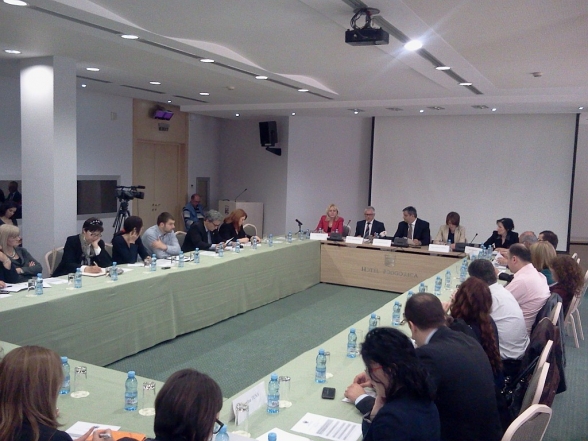In order to get familiarized with the content of the negotiation chapter 2 - Freedom of movement for workers and Chapter 28 - dedicated to consumer protection and health, the public debate held today brought together representatives of state institutions, civil society, the media and the public.
Noting the importance of the role of the Committee on European Integration in the negotiation process in terms of improving transparency and inclusiveness, the Head of the EU Delegation to Montenegro, Ambassador Mitja Drobnič, expressed his views in relation to the areas covered in chapters that were the subject of today's public debate. He pointed out that the free movement of workers was one of the fundamental rights of the EU, but also a factor of competitiveness in its market, and that it contributed not only to an increase in employment, but also to solving the structural problems of society through promotion of expertise and provision of a comprehensive positive impact on economic growth. The Ambassador drew attention to the audience that during negotiations it could be expected that Member States required transitional period for the Chapter 2 - Freedom of movement for workers, but that it was not a specificity of Montenegro, because such a practice had been known since the great enlargement in 2004. Restrictions are aimed at reducing potential abuse of uninterrupted stay and work under the same conditions in all Member States.
The discussion on the public debate was also conducted on the possibilities offered by the EURES network, as well as the European Health Insurance Card. EURES is a tool for facilitating mobility, that is the geographical and professional mobility of labor force in the European labor market. The purpose of EURES is to provide information, counseling and mediation services, both for employers and those seeking employment. On the other hand, the purpose of the European Health Insurance Card is to provide the necessary health services outside the home Member State. Although the ability to use it will only be possible after becoming a member of the EU, Montenegro is now trying to sign bilateral agreements on the use of the European Health Insurance Card with the EU countries.
When it comes to the Chapter 28 - Health and Consumer Protection, it was jointly agreed that it was necessary to further harmonize and strengthen administrative capacity. In this regard, it is necessary to raise awareness in Montenegro on consumer rights to be protected. In this respect, the most important role is that of consumer protection organizations which, in cooperation with the state, should provide education and effective informing programs that will contribute to understanding of mechanisms of protection of consumers' interests.
On the panel, which was moderated by the Chairman of the Committee, Mr Slaven Radunović, the introductory speakers, aside from the Ambassador Mitja Drobnič, were Ms Ariana Nikolić Vučinić, a member of the Negotiating Group for the Chapter 2, Ms Vukica Jelić, Head of the Working Group for Chapter 2, and Ms Rada Marković, Head of the Working Group for Chapter 28.









